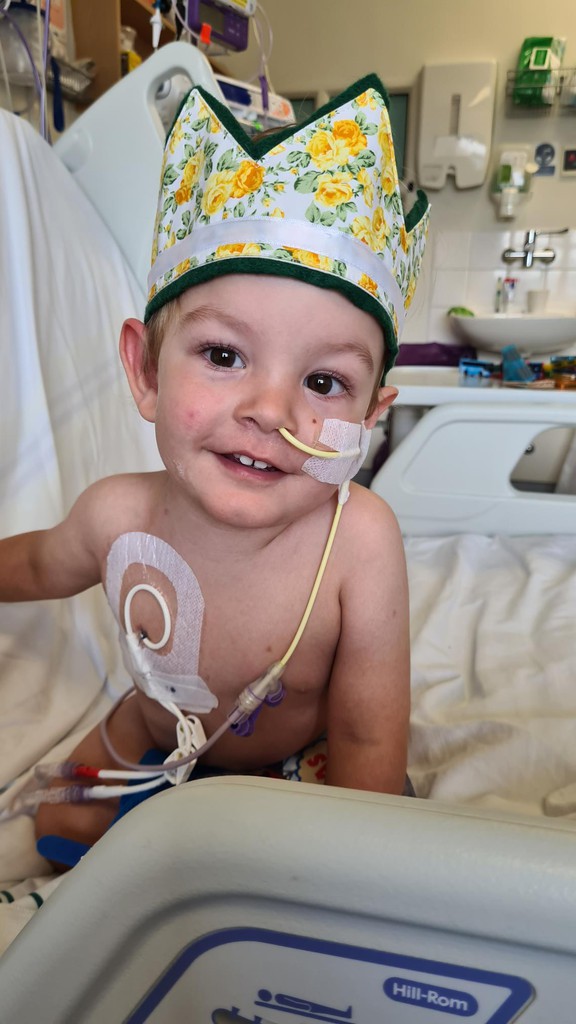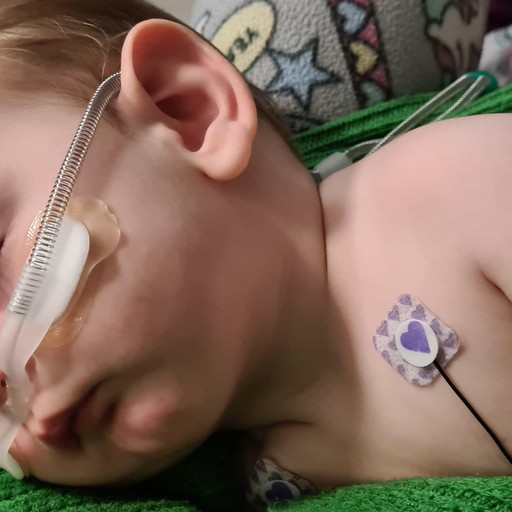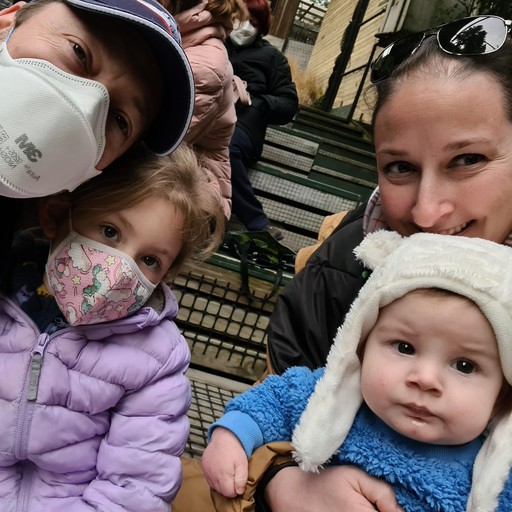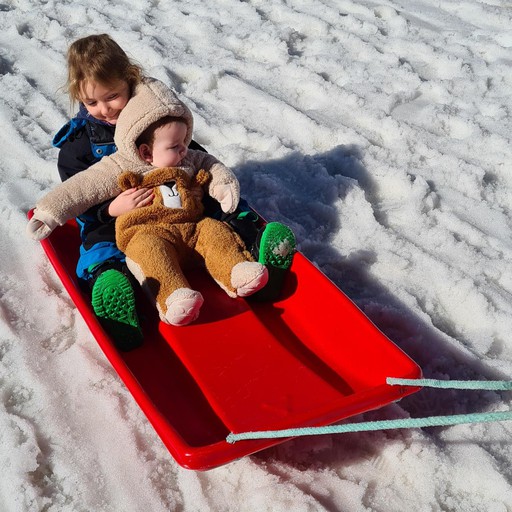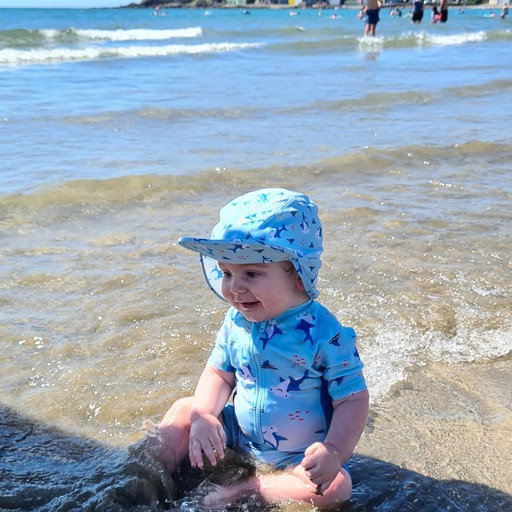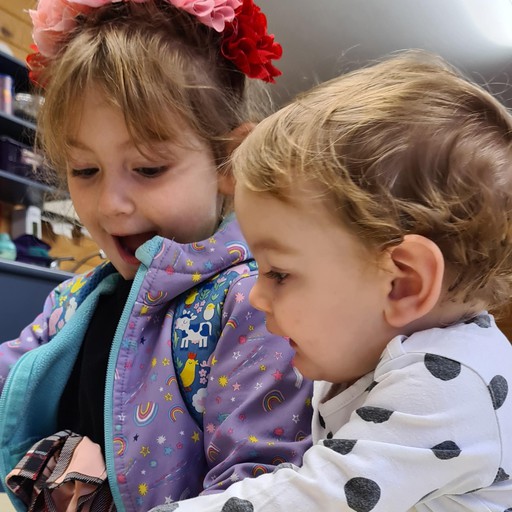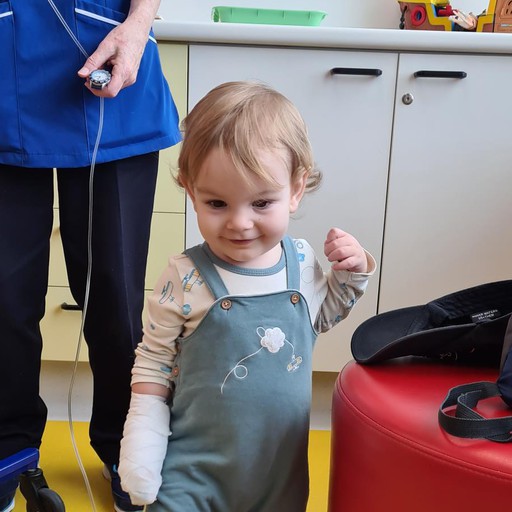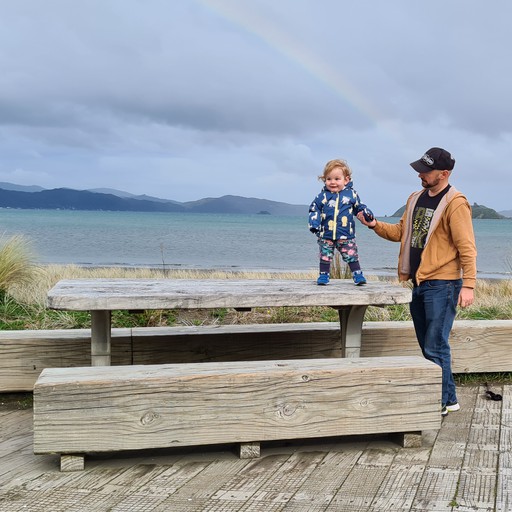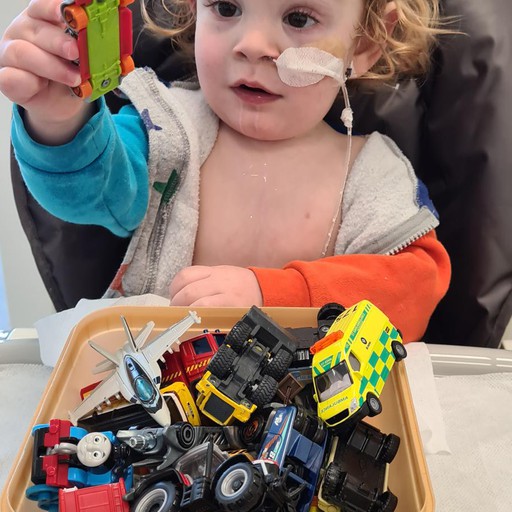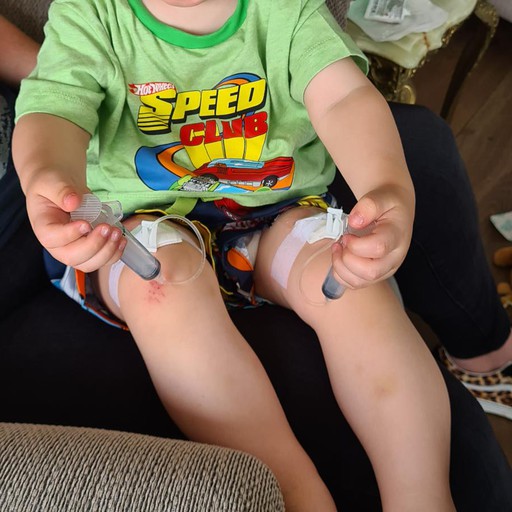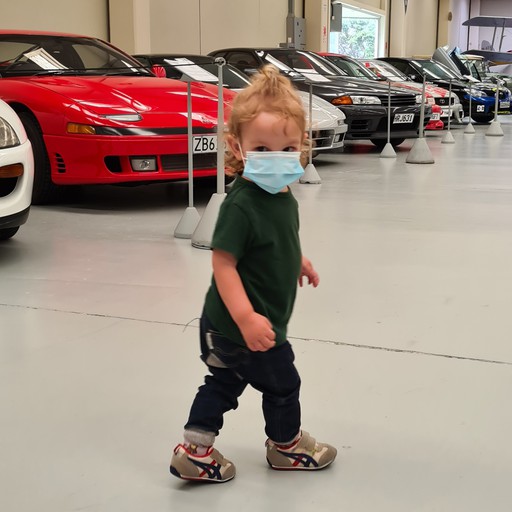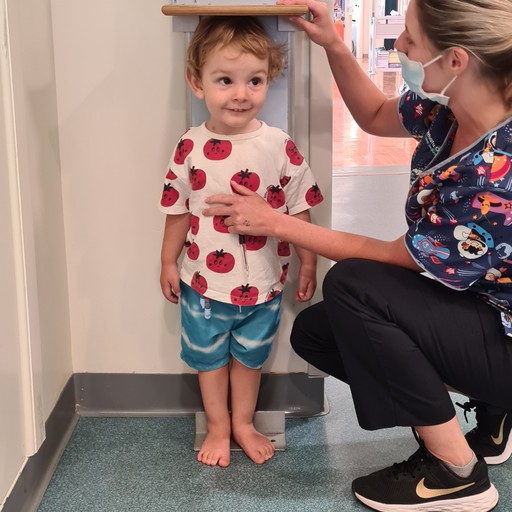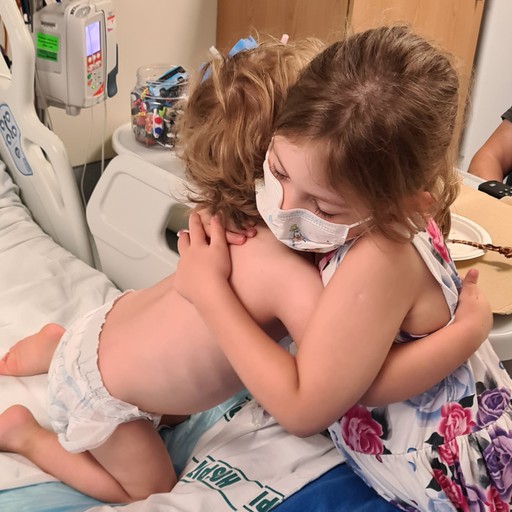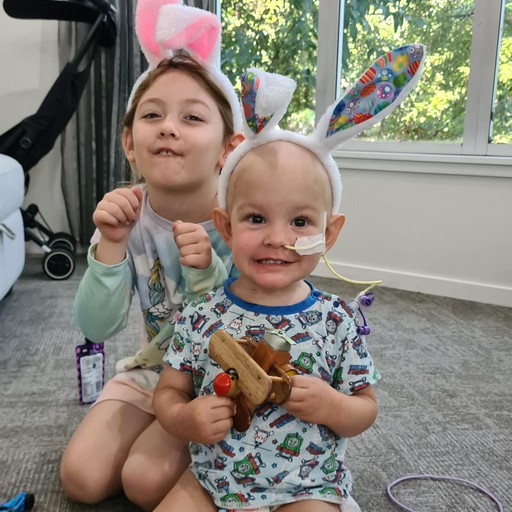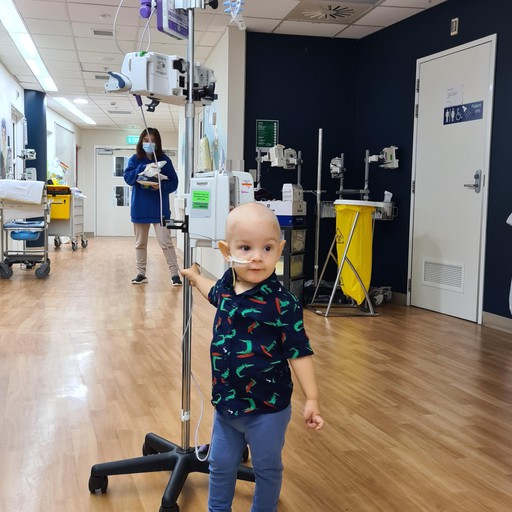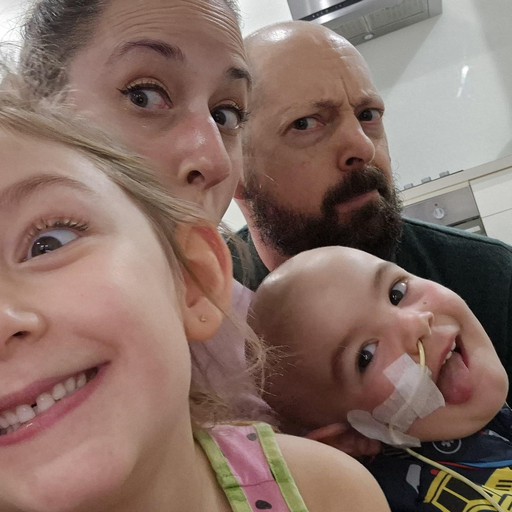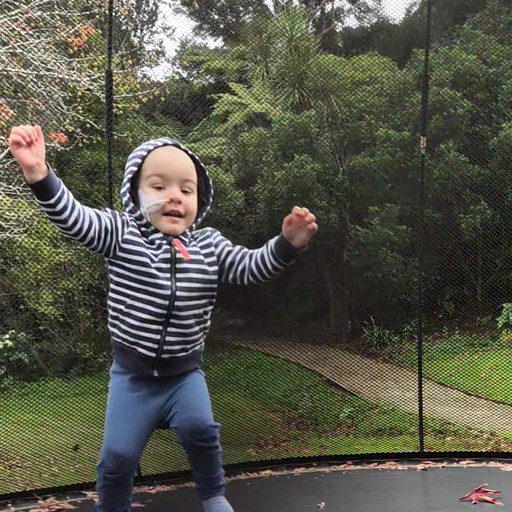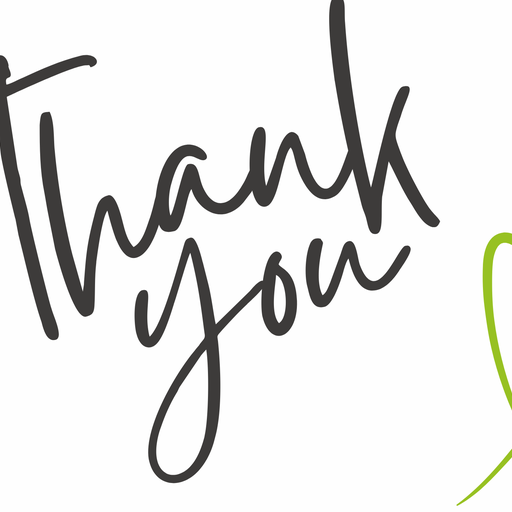My Story:
Luca
From Wellington
Luca is almost 2.5 years old, and we have passed 80 days since he had a stem cell transplant to replace his immune system, following his diagnosis with Hyper IgM Syndrome in May 2023. Our journey as a family navigating the uncertainty of a rare Primary Immune Deficiency to date can be split into three parts, Pre-Diagnosis, Post-Diagnosis, and Stem Cell Transplant. It has been riddled with worry, frustration, uncertainty, dread, fear, and periods of hopelessness, all the fun emotions that come with a total lack of control in the face of a serious, life-threatening illness.
Pre-Diagnosis The 12 months preceding Luca's diagnosis were a whirlwind in all the worst ways. He began getting sick with recurring respiratory and ear infections when he was about 4.5 months old, shortly before starting daycare. We didn't think too much of it as we knew that this was the normal age for babies to start catching germs, and his big sister was attending daycare full-time, the obvious source of nasty, easily transmissible bugs. However, we soon noticed that his symptoms persisted despite regular treatment with antibiotics, and as soon as a course was finished, he would develop fevers and be in severe pain within the next couple of days. As a new bout of illness was beginning, we would notice a little red spot in his nappy and knew immediately how the next few days would transpire. In the absence of sound medical advice (all official resources exhausted) we tried supplementing Luca with Vitamin D drops and probiotics, all the things that Inst-paediatrics and the internet, within reason, recommended to boost immunity.
We felt ignored and dismissed by all the doctors at our medical practice (believe us when we say we saw them all) and at the emergency room when we said we didn't think it was normal to be this sick all the time and so our fortnightly routine of spontaneous trips to the ED and unexpected ambulance rides continued for several months. Luca was always pale and had dark bags under his eyes, but It was always the same story from what seemed to be a handbook of dismissive comments to recite to paranoid parents, "this is normal, he has an older sibling in daycare, Wellington weather, bad luck, it'll self-resolve as he grows, is your house warm and dry?" This was also the response when he was admitted to hospital three times, twice for pneumonia and once for bronchiolitis. His diagnoses with pneumonia shook us; we had never known anyone who had had pneumonia, it certainly wasn't common among children when we were growing up, and to our knowledge pneumonia ended adults up in ICU. I remember, vividly, lying awake next to him in the dark in bed at night, his breathing sounding like the crackling of cellophane, waiting for him to stop breathing.
It was only during his second pneumonia that a paediatrician at the hospital expressed any hint of concern, stating that he didn't "look" like he had an immune deficiency, and that these diseases were rare and the children who had them were usually pale and skinny. After 9 months of waiting for the fluid in Luca's ears to clear we took matters into our own hands and demanded a referral to a private ENT, which eventually resulted in life-changing grommet surgery (the post-surgery notes read, "copious glue removed). We would also have to request a referral to see a paediatrician multiple times before one was actually made, in addition to making requests for Luca to be treated with stronger antibiotics when his pneumonia symptoms were evidently not clearing. The months leading up to grommet surgery and our much-anticipated appointment with the paediatrician blurred into a haze of long work days and sleepless nights as we failed to realise just how much pain our poor baby was in. We did countless fluid tests as he lost weight and dehydrated, and had the perpetual stench of spilled Pamol, Pedialyte, antibiotics, vomit and sweat on pyjamas that we never seemed able to change out of. Despite having regular blood tests, for which we received the disapproving judgement of an emergency doctor, not once were his immunoglobulins tested, which would have revealed immediately and easily that he had a serious underlying health condition.
Our persistence and determination eventually culminated in a consultation with a paediatrician. After his review we were asked what our expectation of the appointment was, and our response was that we wanted all the tests done to rule out any potential underlying causes for Luca's recurring respiratory and ear infections. We were advised that some uncommon tests would be done, not to expect an unusual result, and that we'd receive a phone call if anything untoward cropped up. In the month leading up to the grommet surgery we isolated from friends and took Luca's sister out of daycare in an effort to prevent him from getting sick again. Two days before, Luca's paediatrician called us in to do repeat blood tests because the previous test's results were anomalous. She didn't want to give the strange result a name until this and some further tests were done, and was clear that the condition would be chronic. Bloods were done together with a chest x-ray that the paediatrician used to motivate for proceeding with the grommet surgery, despite Luca's persistent illness. The day after his grommet surgery in Palmerston North he received his first IVIg treatment at Wellington Children's Hospital, and on the Friday we had our first appointment with his immunologist, where he was tentatively diagnosed with x-linked Hyper-IgM Syndrome, pending genetic testing. This was the first time we heard a name for his condition, and it was during this first consultation that Luca's immunologist mentioned that his immune system could be replaced by a stem cell transplant.
Post-Diagnosis In the space of five days we had gone from thinking that grommets would solve Luca's problems to having our entire world turned upside down. We were utterly exhausted from 12 months of fighting against the public health system and a lack of continuity of care at the GP, all of which we had had to endure alone in the absence of any family in New Zealand. We felt alone and isolated. We didn't know anything about Primary Immune Deficiencies, nor was there history of PIDs in either of our families. Our daughter was healthy and had had no health complications. Given that this disease is hereditary from the maternal line, surely we'd have known about it. We were very pragmatic in dealing with the news and even felt vindicated and somewhat relieved to have a diagnosis (we weren't paranoid or crazy!).
However, the gravity of the situation would hit us in due course, and we would find ourselves making a habit of flying our parents to New Zealand to stay with us for as long as possible and help care for Luca and his sister while we worked. The next couple of months were spent learning how to deal with a special needs child, sterilising eating utensils and drinking water, ensuring that Luca was eating a low-risk diet, pulling him out of daycare until we could come up with a plan to manage his needs there, devising a timetable to administer his multitude of prophylactic medications, and feeling neurotic every time we tried to visit the beach or go for a walk in the forest. Occasionally we'd have little meltdowns, mainly when we tried to look up more on the condition online, resulting in immediate overwhelm. We were assigned an incredible community nurse who provided us with all the equipment we needed and began teaching us how to administer fortnightly subcutaneous IgG ourselves. Luca contracted the odd viral infection during this time, including while RSV ran rampant at daycare. So far it seemed his condition was treatable and manageable, which despite, being upsetting and dare I say, inconvenient, was certainly by no means a death sentence. It was at this time that we joined the IDFNZ and started attending the Wellington group meet-ups. It was reassuring to meet families experiencing similar challenges, and even more reassuring to meet adults who have successfully navigated their way through their own PIDs. Towards the end of July 2023 Luca developed some sores in his mouth.
After more medical roundabout with GPs and dentists who could only do impractical phone consultations he stopped eating again despite our greatest efforts. As soon as his paediatrician heard he had mouth ulcers she called us in for another blood test, which revealed that he was neutropenic, a known complication that can develop in Hyper-IgM patients. Luca was immediately admitted to hospital and administered G-CSF. Initially his bone marrow responded to the drug, but over the next week his condition deteriorated, with the mouth lacerations spreading and growing. His face swelled so much from the mucositis that he looked like he'd been punched in the face, his mouth stank terribly, he was drooling uncontrollably and, and he was inconsolable from pain. We grew weary of seeing different doctors everyday doing general rotations, and it felt like there was a lot of faffing and very little action with conviction, to the point where we complained to the Consultant overseeing Luca's treatment about a lack of communication. Our complaint was taken seriously, and we noticed a marked improvement in communication from that point forward. Luca's treatment also began being primarily managed by a single Registrar who consulted with his immunologist at Starship Hospital regarding his treatment. Over the following weeks the doctors experimented with different G-CSF spacings, but his neutrophil levels failed to stabilise. We would remain in hospital for 5.5 weeks, during which the medical team would begin collecting bloods from all of us to do tissue typing for the stem cell transplant.
Following discharge from the hospital, we took to isolating Luca even further from potential sources of infection, formally taking him out of daycare. This took a toll on our entire family as we were hesitant to allow our daughter to attend parties or indoor events/playgrounds where she could contract some virus. We became paranoid about going to the shops, our daughter's school, or even visiting friends. The urgency to establish a time frame for the stem cell transplant heightened as Luca's medical team experimented with different G-CSF dose spacings and determined that he was dependent on it. At this point our community nurse taught us how to administer the daily G-CSF injections in the comfort of our own home. We were at the very limit of what medication and Ig infusions could do for him, and we felt desperate knowing that if he wasn't even 2 years old and had already developed a complication it could only get worse. "Manageable and treatable" had lasted us a meagre 2 months and our "new normal" felt entirely unsustainable. At our next Immunology appointment, we informed Luca's specialist that we wanted to go ahead with a transplant. We were advised that preliminary results had shown our daughter to be the best match for him; despite our best efforts to shelter her from the ensuing chaos, if she was the best donor, we would need her to donate. We thought that confirming our decision would help us gain some traction but learnt in the most frustrating way that the preparation for a stem cell transplant really does take time. For months we, through our community nurse, paediatrician and IDFNZ, nagged weekly for updates to no avail, constantly checking the post box for an appointment slip from the transplant team.
It was agonising not being able to plan and having so little certainty over our immediate and short-term future. We spiralled in the utter lack of control we had in our lives, knowing that there was very little that Luca's nurse and paediatrician in Wellington could do to expedite things. They could only support us emotionally and request better communications from the already thinly stretched transplant team in Auckland. At the end of 2023 the wheels started turning and we were provided with a potential time frame for the transplant. We had an online appointment with Luca's transplant specialist and specialist nurse, and then were flown to Auckland to visit Starship Hospital, meet the team, see the facilities, and have some blood tests done. We were advised to prepare for a minimum of 6 weeks in isolation 100 days in Auckland. The month following this was difficult - it was Christmas holidays so hospital staff were on leave, and although we'd been told that the transplant would happen early in the new year, we still didn't know when exactly we would have to pack our lives and move to another city for an indeterminate period. All we knew was that we would have to leave at short notice, so we warned our employers that we knew it was coming, we didn't know when, and we would be maxing out our annual and domestic leave. Who would look after our cat? Who would keep an eye on our house? Who would water the indoor plants? And the outdoor ones, for that matter? Finally, towards the end of January 2024, we got the phone call, "be in Auckland for 12 February; we'll do bloods on the Tuesday, and Luca's Hickman line will go in on the Wednesday and they'll do the testicular biopsy at the same time." We had so many questions, mostly logistical, that wouldn't be able to be answered until we actually started the journey to stem cell transplant. Stem Cell Transplant We didn't decide to proceed with a stem cell transplant effectively to cure Luca of Hyper-IgM Syndrome. We hardly even discussed it. It was the logical conclusion that this was the only course of action, and the sooner it could happen, the better.
We arrived in Auckland on 11 February 2024 after a weekend road trip, ready to face the week, start Luca on his pre-transplant journey, and prepare our daughter for her stem cell donation. Risks were discussed, including the likelihood of infertility, the possibility of developing secondary cancers, and even the possibility of fatality. Consents were signed. We continued to cope with all the bomb-dropping fairly pragmatically, including a logistical hiccup and unusual blood result which caused Luca's chemotherapy to be deferred twice. Suddenly we received the fateful call, "Everything is ready. How soon can you get to the hospital?" We were packed and were admitted to the Bone Marrow Transplant within an hour. So began Luca's week of chemotherapy. We had been warned that the first day is often the worst, and can end children up in ICU, so we braced ourselves. It was a strange feeling, wanting something as terrifying as chemotherapy to happen, fearing what could transpire, knowing that we had to face such darkness before we could even begin to hope to see light. Luca seemed to tolerate the drug well despite some discomfort and slightly laboured breathing. What seemed to be minor symptoms and a possible pulse oximeter malfunction to us were closely monitored by a swarm of nurses and doctors who descended upon us. This was an entirely new experience to us, so much attention and such close monitoring. The sudden start of his treatment and the seriousness of the medical team and all their protective gear were overwhelming, but as the days of chemotherapy progressed we took them in our stride and became accustomed to our routine in isolation.
Luca cruised through the chemo, remaining in good spirits. Throughout the week we settled into our room, decorating it with family Polaroids, drawings, and cards. We watched the helicopters landing on the landing pad outside our window and admired the Sky Tower. Thomas and Friends and Paw Patrol were on a constant rotation and used in conjunction with mini collectibles and Hot Wheels to trick Luca into accepting food. As soon as we expressed the slightest concern about his eating an NG tube was inserted and Luca was placed on a feeding pump. Much to our relief, Luca's week of chemotherapy turned out not to be as harrowing as we were expecting it to be, and suddenly our daughter was being prepared for her stem cell harvest. The harvest went very well; there were no complications and the surgeons extracted twice as many stem cells as the acceptable base level for transplant. They were brought up to Luca's room while our daughter was still in recovery, and the transplant began immediately. It was an emotional moment for us, holding a bag of lifesaving stem cells, so fresh it was still warm, given by one of our children to the other. We would now need to watch closely for more symptoms, such as the onset of mucositis and Graft vs Host Disease (GVHD). Although mucositis did eventually develop, it was insignificant compared to what Luca had experienced in 2023, but we didn't hesitate to get him started with strong pain relief. He also developed an expected rash post-transplant, but this was managed using topical medication only. At some point he needed a platelet transplant, and he also eventually lost his hair.
We continued decorating our room, taking more Polaroids and building LEGO Botanicals given that we couldn't keep actual flowers in the room. Slowly but surely Luca's blood counts started to improve, and his recovery was going so well that at 3 weeks to the day post-transplant, we were discharged from the ward and allowed to return to our apartment at Ronald McDonald House. The early discharge was a bit intimidating; we would have to learn to administer Luca's numerous medications through his NG tube, figure out how to schedule them throughout the day, and learn how to keep him fed and hydrated using the tube feed pump as well. We'd also have to return to the clinic twice a week for blood tests and reviews. Despite the load, Luca's medical team assured us of their confidence in our ability to manage his recovery. Since then, Luca has been making a steady recovery; his regular blood tests show that his neutrophil levels have stablised, and his total blood counts continue to improve. He has had the odd viral infection, and his GVHD rash has occasionally flared up, but his symptoms have been mild and have not required hospitalisation. His hair has begun growing back, this time quite dark, and he is very hairy with thick, black eyebrows thanks to his anti-rejection medication (initially we thought that his sister had coloured his eyebrows in with makeup!). He has even had his Hickman Line removed.
Thirty- and 60-days mark significant milestones in the journey of stem cell transplant recovery. This is when several additional tests are done in conjunction with the regular ones, such as monitoring chimerism (the proportion of donor to recipient cells) and various other immune function tests. They have also corresponded with ongoing monthly treatments. Luca's chimerism results have been ok; some variability, although disheartening, can be expected, and there is no published magic threshold above which his sister's stem cells will just do their job. The behaviour and interaction between the various components of the immune system, we have learnt, is highly nuanced, and there is no straightforward recipe to make it work. We liken it to a mixing desk, where levels, EQ and compression (in this case medication and the affects thereof) need to be experimented with and adjusted to achieve the ideal mix for an individual song. We're coming up to Day 100 post-transplant, when more big tests will be done, and after which, unless Luca takes an unexpected turn for the worse, we'll be able to return home and eventually stop sterilising everything and avoiding certain foods.
Our experience with transplant has been the antithesis of the months leading up to Luca's diagnosis, and our time spent in hospital in Wellington. We have felt safe and secure in the experienced hands of the nurses and doctors at Starship Hospital, and importantly, have felt listened to. No concern has ever been too big, and it has been reassuring experiencing swift action whenever Luca has needed additional assessment. We have also received tremendous support from the IDFNZ throughout our journey - the children have regularly received cheer gifts throughout our stay in Auckland. Mom and dad have received essential parking, meal and supermarket vouchers, alleviating some of the pressure of the cost of living in a more expensive city for a while, while only earning a part-time salary. We also recently enjoyed a much-needed change of scenery at the IDFNZ's respite house at Red Beach. Our nurse in Wellington has checked in on us, reassuring us that she will be there for us when we get home, continuing to support us along the path to Luca's full recovery. We are only at the beginning of this new chapter in Luca's life; recovery is slow, chimerism may vary, and there is still the very real chance that he may develop chronic GVHD, or that the transplant graft may fail. After over two years of bad news that seemed only to get worse at every turn, it is difficult not to catastrophise and live in the perpetual fear of, and even try plan for, the worst outcome, but we are learning to let go of these thoughts. Although traumatic, adversity has made our little family unit even tighter, and although we mourn being robbed of Luca’s babyhood and all of its exciting milestones, we look forward to his health's continuous improvement and all of its associated milestones we have yet to reach.

